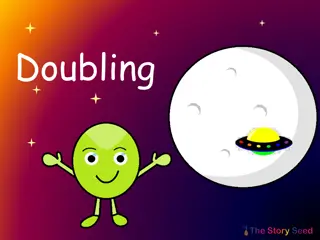
Interactive Sessions and Sibling Music Connections in a Space Adventure
Explore interactive sessions, sibling relationships in music, and the thrilling space adventure of the SpaceShip Operator Lieven de Cock. Discover intriguing connections and sorting methods in music with famous siblings. The journey concludes with a successful landing of the spaceship.
Download Presentation

Please find below an Image/Link to download the presentation.
The content on the website is provided AS IS for your information and personal use only. It may not be sold, licensed, or shared on other websites without obtaining consent from the author. If you encounter any issues during the download, it is possible that the publisher has removed the file from their server.
You are allowed to download the files provided on this website for personal or commercial use, subject to the condition that they are used lawfully. All files are the property of their respective owners.
The content on the website is provided AS IS for your information and personal use only. It may not be sold, licensed, or shared on other websites without obtaining consent from the author.
E N D
Presentation Transcript
SpaceShip Operator Lieven de Cock www.codeblocks.org
Interactive Session Who are these ? 2
Interactive Session Who are these ? 3
Interactive Session Who are these ? 4
Interactive Session Who are these ? 5
Interactive Session Who are these ? 6
Siblings in Music Struct : SirName, FirstName Vector of these Sort 7
Siblings in Music : Solution std::vector<SiblingsInMusic> siblings { {"Jackson", "Tito"}, {"Jackson", "Jackie"}, {"Jackson", "Michael"}, {"Jackson", "Jermaine"}, {"Jackson", "Marlon"}, {"Gallagher", "Noel"}, {"Gallagher", "Liam"}, {"Jackson", "Janet"}, {"Gibb", "Robin"}, {"Gibb", "Barry"}, {"Gibb", "Maurice"}, {"Minogue", "Kylie"}, {"Minogue", "Dannii"} }; struct SiblingsInMusic { std::string sirName; std::string firstName; auto operator<=>(const SiblingsInMusic&) const = default; }; std::ranges::sort(siblings); std::ranges::for_each(siblings, [](const auto& sibling) { std::cout << sibling.sirName << " " << sibling.firstName << std::endl; }); 8
The SpaceShip has landed That s it folks ! 9
Operators Equality Relational 10
The Past Out test class : MagicInt class MagicInt { public: MagicInt(int val) : mValue{val} {} bool operator== (const MagicInt& rhs) const { return mValue == rhs.mValue; } bool operator< (const MagicInt& rhs) const { return mValue < rhs.mValue; } private: int mValue; }; Implicit constructor Compare Sortable Problem: mi == 242 : OK 242 == mi : WOOPS 11
The Past : fix the compare problem class MagicInt { public: MagicInt(int val) : mValue{val} {} bool operator== (const MagicInt& rhs) const { return mValue == rhs.mValue; } private: int mValue; }; bool operator== (int lhs, const MagicInt& rhs) { return rhs == lhs; } Honor mathematics Scott Meyers : act as an int So == ==> 2 methods needed Free method which swaps operands 12
The Past : fix the compare problem hidden friends 1 (free) method Both arguments can be implicitly converted class MagicInt { public: MagicInt(int val) : mValue{val} {} friend bool operator== (const MagicInt& lhs, const MagicInt& rhs) { return lhs.mValue == rhs.mValue; } private: int mValue; }; 13
The Past : all 6 == < <= ( == or <) != ( not ==) > ( not <=) >= ( not <) 14
The Past : all 6 friend bool operator== (const MagicInt& lhs, const MagicInt& rhs) { return lhs.mValue == rhs.mValue; } friend bool operator!= (const MagicInt& lhs, const MagicInt& rhs) { return !(lhs.mValue == rhs.mValue); } friend bool operator< (const MagicInt& lhs, const MagicInt& rhs) { return (lhs.mValue < rhs.mValue); } friend bool operator<= (const MagicInt& lhs, const MagicInt& rhs) { return (lhs.mValue < rhs.mValue) || (lhs.mValue == rhs.mValue); } friend bool operator>= (const MagicInt& lhs, const MagicInt& rhs) { return !(lhs.mValue < rhs.mValue); } friend bool operator> (const MagicInt& lhs, const MagicInt& rhs) { return !(lhs.mValue <= rhs.mValue); } 15
The Past : be complete [[nodiscard]] friend constexpr bool operator== (const MagicInt& lhs, const MagicInt& rhs) noexcept { return lhs.mValue == rhs.mValue; } noexcept constexpr [[nodiscard]] friend constexpr bool operator!= (const MagicInt& lhs, const MagicInt& rhs) noexcept { return !(lhs.mValue == rhs.mValue); } [[nodiscard]] [[nodiscard]] friend constexpr bool operator< (const MagicInt& lhs, const MagicInt& rhs) noexcept { return (lhs.mValue < rhs.mValue); } [[nodiscard]] friend constexpr bool operator<= (const MagicInt& lhs, const MagicInt& rhs) noexcept { return (lhs.mValue < rhs.mValue) || (lhs.mValue == rhs.mValue); } [[nodiscard]] friend constexpr bool operator>= (const MagicInt& lhs, const MagicInt& rhs) noexcept { return !(lhs.mValue < rhs.mValue); } [[nodiscard]] friend constexpr bool operator> (const MagicInt& lhs, const MagicInt& rhs) noexcept { return !(lhs.mValue <= rhs.mValue); } 16
C++20 : Rewrites a == b : compiler will try Equality operator == A a; B b; a == b a != b : compiler will try b == a a != b !( a == b) !( b == a) Note : it will NOT try (b != a) 17
C++20 : Rewrites const MagicInt f1{242}; const MagicInt f2{100}; class MagicInt { public: MagicInt(int val) : mValue{val} {} std::cout << (f1 == f2) << std::endl; /// OK std::cout << (f1 != f2) << std::endl; /// rewritten as !(a==b) bool operator== (const MagicInt& rhs) const { return mValue == rhs.mValue; } std::cout << (f1 == 242) << std::endl; /// OK std::cout << (242 == f1) << std::endl; /// rewritten as (b==a) private: int mValue; }; std::cout << (f1 != 242) << std::endl; /// rewritten as !(a==b) std::cout << (242 != f1) << std::endl; /// rewritten as !(b==a) Note : no hidden friend here !!! 18
C++20 : Rewrites : Endless Recursion const MagicInt f1{242}; std::cout << (f1 == 242) << std::endl; std::cout << (242 == f1) << std::endl; // gcc 11.3/12 warns, on the above function // in c++20 this comparison calls the current function recursively with reversed arguments // infinite recursion detected [-Winfinite-recursion] // clang 14 // all paths through this function will call itself [-Winfinite-recursion] class MagicInt { public: MagicInt(int val) : mValue{val} {} bool operator== (const MagicInt& rhs) const { return mValue == rhs.mValue; } private: int mValue; }; bool operator== (int lhs, const MagicInt& rhs) { return rhs == lhs; } Danger : your codebase can break prefers to call itself with swapped operands, which is a better match than the member function which needs a type conversion 19
C++20 : Rewrites : Endless Recursion solutions Only C++20 remove this method, no longer needed return rhs.operator==(lhs) return rhs == MagicInt{lhs} bool operator== (int lhs, const MagicInt& rhs) { return rhs == MagicInt{lhs}; } bool operator== (int lhs, const MagicInt& rhs) { return rhs.operator==(lhs); } 20
SpaceShip : operator<=> Rules of the game different depending on: Defaulted Not defaulted Don t call it yourself (it is an implementation detail), use the normal operators (which it brings to the table) Depending on the members support: constexpr noexcept similar rewriting if the first operand can be "implicitly type converted" 21
SpaceShip : operator<=> takes preference over all other relational operators Return type : something that can be compared to 0 #include <compare> const MagicInt f1{242}; const MagicInt f2{100}; std::cout << (f1 < f2) << std::endl; std::cout << (f1 > f2) << std::endl; std::cout << (f1 <= f2) << std::endl; std::cout << (f1 >= f2) << std::endl; std::cout << (f1 == f2) << std::endl; std::cout << (f1 != f2) << std::endl; const MagicInt f3{242}; std::cout << (f1 == f3) << std::endl; std::cout << (f1 != f3) << std::endl; std::vector vec{f1, f2}; std::sort(vec.begin(), vec.end()); class MagicInt { public: MagicInt(int val) : mValue{val} {} auto operator<=> (const MagicInt& rhs) const = default; private: int mValue; }; 22
SpaceShip : operator<=> : DEFAULTED It gives: 4 relational operators 2 equality operators Compares an object member by member => order matters NOT defaulted => no equality operators ! 23
3-way comparison a OP b a OP b < 0 a OP b == 0 a OP b > 0 eg.: std::strcmp a <=> b a <=> b < 0 a <=> == 0 a <=> b > 0 24
Rewrites x <= y if no matching definition, try (x <=> y) <= 0 0 <= (y <=> x) x <=> y equal to 0 x and y equal or equivalent x <=> y less than 0 x is less than y x <=> y greater than 0 x is greater than y operator != never rewritten to call operator<=> (it might call an operator== generated from a defaulted operator<=>) 25
SpaceShip : operator<=> : constexpr struct Coordinate { double x{}; double y{}; double z{}; auto operator<=> (const Coordinate&) const = default; }; constexpr Coordinate co{1.0, 2.0, 3.0}; static_assert(co < Coordinate{1.1, 0.0, 0.0}); 26
SpaceShip : Not Default No == if needed add it explicitly std::vector<Person> vec{ {"Eric", "Cartman"}, {"Stan", "Marsh"}, {"Kyle", "Broflovski"}, {"Kenny", "McCormick"} }; struct Person { std::string firstName; std::string lastName; auto operator<=> (const Person& rhs) const { return lastName <=> rhs.lastName; } std::sort(vec.begin(), vec.end()); Person author1{"Trey", "Parker"}; Person author2{"Matt", "Stone"}; /// we need to add this one !!! bool operator== (const Person& rhs) const { return lastName == rhs.lastName; } }; std::cout << (author1 == author2) << std::endl; 27
SpaceShip : Multiple Members, and some don t matter Struct Person LastName FirstName Age SomeData (which we don t care about) not default add == implement by calling <=> on the members 28
SpaceShip : Multiple Members, and some don t matter auto operator<=> (const Person& rhs) const noexcept { auto cmp = lastName <=> rhs.lastName; /// 1st criterion if(cmp != 0) { return cmp; } cmp = firstName <=> rhs.firstName; /// 2nd criterion if(cmp != 0) { return cmp; } return age <=> rhs.age; /// 3rd criterion } struct Person { std::string firstName{}; std::string lastName{}; int age{}; std::vector<int> someData{}; bool operator== (const Person& rhs) const noexcept { return firstName == rhs.firstName && lastName == rhs.lastName && age == rhs.age; } 29
Compare / order ??? Can we always compare or order ? Equal versus Equivalent hello const double d1{24.2}; const double d2{10.0}; const double d3{std::numeric_limits<double>::quiet_NaN() }; // ALL FALSE std::cout << (d1 == d3) << std::endl; std::cout << (d1 < d3) << std::endl; std::cout << (d1 > d3) << std::endl; std::cout << (d3 == d3) << std::endl; Hello Nan: Not A Number std::less // BUT std::vector vec{d1, d3, d2}; std::sort(vec.begin(), vec.end()); for(const auto& value : vec) { std::cout << value << ; } 30
Different Comparison Categories Strong Ordering Weak Ordering Partial Ordering Stronger ordering can convert to a weaker one, but not the other way around (implicit type conversions) Is the return type of the <=> operator different return types 31
Strong Ordering (Total Ordering) Any value of a given type is : less than, or equal, or greater than any other value of this type Examples : int, std::string std::strong_ordering std::strong_ordering::less std::strong_ordering::equal (std::strong_ordering::equivalent) std::strong_ordering::greater 32
Weak Ordering Any value of a given type is : less than, or equivalent, or greater than any other value of this type Equivalent does not mean they have to be equal Examples : case insensitive strings std::weak_ordering std::weak_ordering::less std::weak_ordering::equivalent std::weak_ordering::greater 33
Partial Ordering Any value of a given type COULD BE : less than, or equivalent, or greater than any other value of this type It may not be possible to specify an order between 2 values at all unordered Examples : floating point types std::partial_ordering std::partial_ordering::less std::partial_ordering::equivalent std::partial_ordering::greater std::partial_ordering::unordered 34
Avoid if ( x <=> y == std::strong_ordering::equal) might not compile if ( x <=> y == 0 ) 35
What in case of multiple ordering criteria of different comparison categories std::string strong struct Person { std::string firstName{}; std::string lastName{}; double age{}; std::vector<int> someData{}; double partial What is return type of operator<=> ? bool operator== (const Person& rhs) const noexcept { return firstName == rhs.firstName && lastName == rhs.lastName && age == rhs.age; } auto nope : different return types will be deduced 36
Go for the common ground weaker type std::partial_ordering operator<=> (const Person& rhs) const noexcept { auto cmp = lastName <=> rhs.lastName; /// 1st criterion if(cmp != 0) { return cmp; } cmp = firstName <=> rhs.firstName; /// 2nd criterion if(cmp != 0) { return cmp; } return age <=> rhs.age; /// 3rd criterion } First 2 strong implicit conversion to partial Third one partial 37
Map to the stronger type std::strong_ordering operator<=> (const Person& rhs) const noexcept { auto cmp = lastName <=> rhs.lastName; /// 1st criterion if(cmp != 0) { return cmp; } cmp = firstName <=> rhs.firstName; /// 2nd criterion if(cmp != 0) { return cmp; } const auto res = age <=> rhs.age; /// 3rd criterion if(res == std::partial_ordering::less) { return std::strong_ordering::less; } else if (res == std::partial_ordering::equivalent) { return std::strong_ordering::equal; } else if (res == std::partial_ordering::greater) { return std::strong_ordering::greater; } /// aka --> std::partial_ordering::unordered --> let's just choose something, eg less /// or when we assume that an std::partial_ordering::unordered should not happen, we could throw return std::strong_ordering::less; } First mappings trivial What to do with unordered ? 38
Map to the stronger type (there is help for double) std::strong_ordering operator<=> (const Person& rhs) const noexcept { auto cmp = lastName <=> rhs.lastName; /// 1st criterion if(cmp != 0) { return cmp; } cmp = firstName <=> rhs.firstName; /// 2nd criterion if(cmp != 0) { return cmp; } return std::strong_order(age, rhs.age); /// 3rd criterion } Also works for NaN std::compare_three_way function object for operator<=> (similar like std::less function object for operator<) 39
What if we dont know the types (generic code) ? What could be the comparison categories for those unknown types ? Who is stronger, who is weaker ? determine the common ground (aka the 'greatest common divisor'): std::common_comparison_category<T1, T2> computes the strongest comparison category 40
What if we dont know the types (generic code) ? struct Person { std::string name{}; double value{}; std::vector<int> someData{}; auto operator<=> (const Person& rhs) const noexcept -> std::common_comparison_category_t<decltype(name <=> name), decltype(value <=> value)> { const auto cmp = name <=> rhs.name; if(cmp != 0) { return cmp; } return value <=> rhs.value; } }; 41
Rewrites / Overload Resolution : Equality operators x != y Compiler will try: note: a rewritten expression never tries to call a member operator!= x.operator!=(y) operator!=(x, y) ! x.operator==(y) ! operator==(x, y) ! y.operator==(x) ! x.operator==(y) (generated from x.operator<=>) ! y.operator==(x) (generated from y.operator<=>) 42
Rewrites / Overload Resolution : Relational operators Rewritten statements fall back on operator<=> and compare the result with 0 Example : x <= y Compiler will try: x.operator<=(y) operator<=(x, y) x.operator<=>(y) <= 0 operator<=>(x, y) <= 0 43 0 <= y.operator<=>(x)
Concepts Require all 6 operators Standard concept : three_way_comparable class NonDefaultedInt { public: NonDefaultedInt(int val) : mValue{val} {} template <typename T> requires std::three_way_comparable<T> void foo(const T& /*t*/) { } { public: MagicInt(int val) : mValue{val} {} auto operator<=> (const NonDefaultedInt& rhs) const { return mValue <=> rhs.mValue; } class MagicInt bool operator== (const NonDefaultedInt& rhs) const { return mValue == rhs.mValue; } auto operator<=> (const MagicInt& rhs) const = default; private: int mValue; }; private: int mValue; }; 44
Concepts foo(242); const MagicInt f1{242}; foo(f1); /// will fail it the <=> is not there const NonDefaultedInt f2{242}; foo(f2); /// will fail it the <=> AND == are not there 45
Concepts Hand made : require <=> Note : <=> does not always bring == NonDefaultInt now has no == in this test template <typename T> concept MySpaceshippable = requires (T t) { t <=> t; }; foo(242); const MagicInt f1{242}; foo(f1); /// will fail it the <=> is not there template <typename T> requires MySpaceshippable<T> void foo(const T& /*t*/) { } const NonDefaultedInt f2{242}; foo(f2); /// will fail it the <=> is not there (== is not required, just <=>) 46
Concepts Hand made and we want all 6 template <typename T> concept MySpaceshippable6 = requires (T t) { t <=> t; t == t; }; template <typename T> requires MySpaceshippable6<T> void foo(const T& /*t*/) { } 47
Concepts Hand made and we want all 6 Use a standard template (equality_comparable) and something we add template <typename T> concept MySpaceshippable6 = std::equality_comparable<T> && requires (T t) { t <=> t; }; template <typename T> requires MySpaceshippable6<T> void foo(const T& /*t*/) { } 48
Inheritance First compares the base classes, going from left to right Defaulted on Derived, as such requires: Operators on the its members Operators on the base class So it does not automatically defaults the base too, the base class has it s own independent life as usual 49
Inheritance struct Base { int x{}; auto operator<=> (const Base& rhs) const = default; }; struct Derived : Base { int y{}; auto operator<=> (const Derived& rhs) const = default; }; 50





